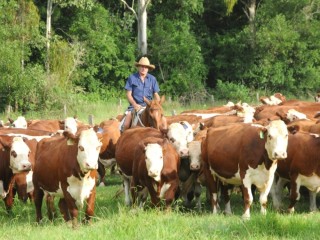 Beef producers across southern Australia are now enjoying good pasture growth rates, but analysts are predicting a later turnoff of prime cattle in some regions.
Beef producers across southern Australia are now enjoying good pasture growth rates, but analysts are predicting a later turnoff of prime cattle in some regions.
While the forced northern turn-off of cattle continues, most analysts believe southern cattle herds have also been trimmed to cope with tough seasonal conditions and this will cut later sale numbers.
ABARE has forecast increased restocker demand in southern states and a three per cent lift in weighted average sale yard prices in 2013-2014, but lack of finance and producer trading confidence, cash flow issues and the need to replenish hay and silage supplies is still limiting trading of store cattle into and across southern Australia.
Elders national livestock and wool manager Chris Howie said supplies of heavy bullocks and cows southof Dubbo were becoming short because of the very cold winter in southern Victoria and lower south-east South Australia.
Many southern cattle were still unfinished with rough winter coats due to the recent wet conditions and lack of sustained warm dry weather.
“They (producers) are probably talking three weeks later on their spring turn-off, while store cattle – plainer heifers and steers – were getting hard enough to move.
“There is not a lot of demand because the feed hasn't got away yet until it dries out,” Mr Howie said.
“They (producers) are still a little bit conservative about buying those plainer type secondary cattle.”
“There was not a lot of demand because the feed hasn't got away yet until it dries out,” he said.
“People are being conservative about buying those secondary type cattle.”
Mr Howie said many banks were still hesitant to lend money against the livestock, though Elders had recently got its StockTrader facility up and running for short-term financing of sheep and cattle.
In southern Victoria and south-east South Australia, following some forced turn-off of cattle due to a late autumn break and then cold wet winter, Mr Howie said producers south of Dubbo who have been able to retain cattle and finish them to feeder weights were in a good position.
“Your spring flush – October, November and into December — in Victoria and lower south-east South Australia will happen.
“It might be two to three weeks later, but the cattle will still come.”
Areas further north rely on feed to trade and though the “right cattle were making the right money”, but secondary cattle or those with more Bos indicus blood were hard to find homes for further south.
After the recent good rains across central and eastern Victoria, north into eastern NSW and into south-east Queensland, Chris said agents at Forbes were saying the falls had turned their season from a “bob-tail spring” into a “pretty good season”.
“They are seeing they haven't yet got inquiry on any numbers of store cattle, but the prime cattle are making good to better-than-good value.”
“Whilst we have got Queensland really punching the numbers into the system you will see your heavy cattle – cows and steers – sell well and the black feeder steers, while the drop-off in price normally occurs around this (last) week,
I think that is going to hang on a bit longer with the season two to three weeks later than normal,” he said.
“In Queensland, down into Goondiwindi and to Narribri, we need a rain in that country so that we are not punching all these lighter end cattle out.
“We want Queensland to cop a rain yesterday and not today and at least take some of the pressure off that store market.”
Highlighting the impact of the northern cattle situation on southern markets, Landmark's national livestock director Mark Barton said “if the north trickles blood we haemorrhage in the south”.
Decent seasonal rains in northern Australia would mean a significant reduction in the availability of grinding beef and a strong manufacturing market in the south from October to January, he said.
“It is also going to be driven by a continuing favourable Australian dollar for trading.”
Mr Barton said restocker demand would be significantly impacted by cashflow.
“Whilst the motivation is that you can't have your place half-stocked, I've never experienced the cashflow and financial pressure that is on people wanting to remain fully-stocked,” he said.
“We've come of the back of a really low production year so people don't have any surplus cash.
“The industry was also shifting away from opportunistic trading to program-based businesses where stock for a pre-destined market.”
Mr Barton said it was hoped that southern Australia produced a grain harvest that ensured the feedlot market was relatively competitive.
Mr Barton said there would be grass-finished cattle available before Christmas, “but there are significantly fewer numbers already on hand because people had to fire-sale a lot of cattle early”.
Some Landmark clients unable to source quality British-bred lines have bought large lines of softer cattle out of Queensland to go south, including to parts of the Riverina having a “bob-tail flush”, to fill southern markets. Queensland lines have also been backgrounded on grass to fill the gap Landmark saw coming from November to February for grain-fed cattle, Mr Barton said.
“Available restocker cattle are not going to be as easy to find as you might think and people that have got them are probably understocked and will try to value-add as much as they can.”
But Mr Barton said the willingness of southern producers to take advantage of this better spring season was going to be availability of stock, cashflow and confidence.
“I can't remember in the past 30 years when my clients have been so depressed for cash and also lost confidence.
“They haven't got the confidence to dive into high value stock again.”



HAVE YOUR SAY